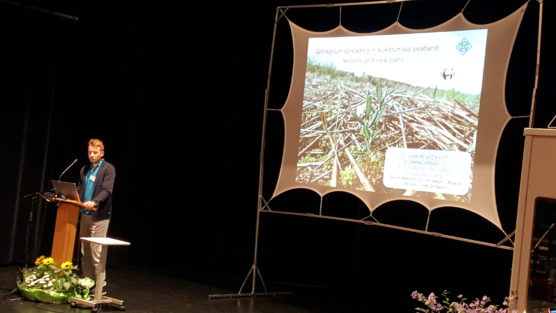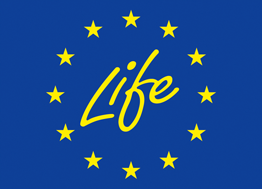Lithuanian Fund for Nature together with project partners Peat Producers Association and Klamann-Deilmann (LT) Company staff participated in a study tour – “Experience of sphagnum cover restoration in exploited peatlands”- to the Emsland region of Germany, from 26 June to July 2. Participants of the study tour took part in a workshop, hosted by Klasmann-Deilann Company, International Congress “Eco innovations for biomass” in Papenburg and visited extracted peatlands in Germany and Netherlands.
 The programme of study tour started with a meeting at Klamann-Deilmann Company headquarters. According to the introduction speech imparted by the head manager, Bert Von Seggern, the company aims to reduce CO2 emissions by 40% until the end of 2025. The targeted emissions reduction is closely linked to plans to develop experimental sphagnum moss farming and paludiculture activities. During the meeting, Lithuanian Fund for Nature also presented its experience with establishing sphagnum moss on exploited peatlands in Lithuania. Experiments were made in specially prepared areas in cut-over parts of Aukštumala. However, these actions require bigger financial resources. Therefore, sphagnum farming experiments will be continued during the upcoming project “Reduction of CO2 emissions by restoring degraded peatlands in Northern European Lowland”, which will aim to restore 5 exploited peatlands in Lithuania. Aukštumala is one of the project sites. Project manager, Nerijus Zableckis, introduced the goals and primary results of this project during the meeting.
The programme of study tour started with a meeting at Klamann-Deilmann Company headquarters. According to the introduction speech imparted by the head manager, Bert Von Seggern, the company aims to reduce CO2 emissions by 40% until the end of 2025. The targeted emissions reduction is closely linked to plans to develop experimental sphagnum moss farming and paludiculture activities. During the meeting, Lithuanian Fund for Nature also presented its experience with establishing sphagnum moss on exploited peatlands in Lithuania. Experiments were made in specially prepared areas in cut-over parts of Aukštumala. However, these actions require bigger financial resources. Therefore, sphagnum farming experiments will be continued during the upcoming project “Reduction of CO2 emissions by restoring degraded peatlands in Northern European Lowland”, which will aim to restore 5 exploited peatlands in Lithuania. Aukštumala is one of the project sites. Project manager, Nerijus Zableckis, introduced the goals and primary results of this project during the meeting.
The guests were invited to visit two sphagnum farming fields (10 ha), where different approaches to control hydrological conditions are being applied. To maintain favorable water level in the sphagnum growing fields, company established embankment-dam system in one site and water pumps from the reservoirs in another. Moreover, monitoring system for GHG fluxes, water level and vegetation dynamics was developed in the sites as well.
During the next day participants of the study tour visited Bourtanger–Bargerveen peatland restoration site in Netherlands. Located near the Germany border Bargerveen nature reserve it is all that remains of an immense raised bog that once covered large parts of East Drenthe, Groningen and neighbouring parts of Germany. Today throughout much of the area only thin layer of basic peat remains. In order to restore damaged site, a network of dams has been constructed. Despite long lasting damage, peatland is famous for unique biodiversity. Over two hundred species of birds have been spotted in the area. Lithuanian team was introduced to the applied restoration measures and the infrastructure for the visitors by the local guide. Right after the visit to Bourtanger–Bargerveen, the study tour participants returned to the Papenburg city in Germany, where the international congress Ecoinovations for biomass took part. The aim of the event was to provide an international platform for the exchange of knowledge about the bio-economy in the non-food sector and to discuss strategies for an efficient material utilization and energy recovery from biomass. For paludiculture (sphagnum, reed, typha etc. growing) and peatland restoration special attention was given during separate session. Lithuanian experience in restoring peatlands and Life project “Reduction of CO2 emissions by restoring degraded peatlands in Northern European Lowland” were also presented.
 Right after the congress Lithuanian team visited Hankausen site, where experimental sphagnum growing fields are being cultivated by the University of Greifswald. The main goal of this experiment is to gain renewable raw material for the production of horticultural growing media. Scientific data from Hankausen peatland shows that rewetting and establishment of Sphagnum moss in abandoned peatlands might help to reduce the rate of CO2 emissions by 2/3 compared to the abandoned pastures in the neighbourhood. Moreover, wildlife, water quality and even local economy might benefit from the project actions as well. However, to make sphagnum farming profitable, support from governmental institutions is necessary.
Right after the congress Lithuanian team visited Hankausen site, where experimental sphagnum growing fields are being cultivated by the University of Greifswald. The main goal of this experiment is to gain renewable raw material for the production of horticultural growing media. Scientific data from Hankausen peatland shows that rewetting and establishment of Sphagnum moss in abandoned peatlands might help to reduce the rate of CO2 emissions by 2/3 compared to the abandoned pastures in the neighbourhood. Moreover, wildlife, water quality and even local economy might benefit from the project actions as well. However, to make sphagnum farming profitable, support from governmental institutions is necessary.
During the last day of the study tour participants were invited to Dümmer lowlands site, which is one of the biggest wetlands in the Lower Saxony. Big shallow lake is surrounded by fen communities of reeds and sedges. However, the site is also effected by intensive farming in the neighbourhood, which has negative impact on water level and quality. Therefore various restoration measures are being implemented during the last decades. To maintain favourable water level, pumps ran by wind power and dams with the manual or automatic water level control system have been installed. Moreover, to fully restore damaged wetland  ecosystem the land is being purchased from local farmers.
ecosystem the land is being purchased from local farmers.
The experience gained during the study tour will be applied in Lithuanian project sites.


